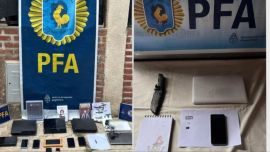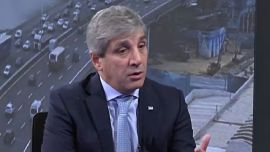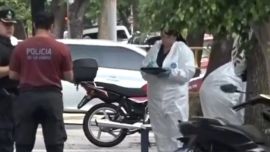Yesterday saw the anniversary of the Russian invasion of Ukraine while this month has seen the election campaign formally start with La Pampa’s PASO primaries and this week's launch of the presidential candidacy of Buenos Aires City Mayor Horacio Rodríguez Larreta (long the opinion poll frontrunner and still the favourite in establishment circles) – this raises the question of how much Ukraine in particular and geopolitics in general are going to enter the electoral debate.
The eve of the anniversary found President Alberto Fernández looking in the opposite direction with his trip to Antarctica to expound his South Atlantic vision but at least he no longer offers Vladimir Putin a “gateway” into South America, as he did last February. The government stance on Ukraine remains tentative with Foreign Minister Santiago Cafiero’s sincere but vague wishes for a ceasefire (with no opinion on the conflicting territorial claims at stake) and expressing “much concern” over Putin’s decision to suspend his participation in the “New Start” bilateral nuclear disarmament agreement with the United States. Yet this diluted backtracking from the previous tacit support for Russia, in tandem with the offers of Argentine citizenship to Nicaraguan dissidents, offers signs of the government recalibrating its foreign policy – perhaps Economy Minister Sergio Massa’s influence is percolating beyond his core sphere into international relations. But this more pro-Western trend may not be sustained – the growing Sino-Russian proximity will pose new challenges, given the central importance of China as a trade and investment partner, quite apart from the global implications.
Nor is the Ukraine war a purely diplomatic issue in Argentine eyes – its economic impact has been enormous. The surge in global commodity prices with the disruption of supplies from the combatant nations who are both leading producers has simultaneously presented Argentina with crisis and opportunity. The war has been a key factor in pushing an inflation already driven by the pandemic money supply glut towards three digits with a momentum difficult to reverse, while the greater volatility and uncertainty in world markets plus the higher interest rates to counter inflation is holding back the investment needed for genuine productive development beyond consumer-led growth (also a factor in inflation). The opportunities would be far greater without Argentina importing rather than exporting energy in the past decade – the war doubled the cost of fuel imports to over US$14 billion last year while grain prices only rose 30 percent (against which should be balanced costlier diesel imports and 20 percent more hard currency to pay for fertilisers despite a sharp fall in use). Furthermore, the farm bonanza has had to grapple with drought while the windfalls served more to finance the fiscal deficit and boost Central Bank reserves than to bolster production. The extreme gap between official and parallel exchange rates together with erratic policies (the “soy dollar”) have also conspired against a steady outflow of grain. Nevertheless, while this tragic conflict has so far been a mixed blessing for Argentina in strictly economic terms, pipelines to exploit the potential of Vaca Muerta shale more fully, the accelerating lithium boom and a government less at odds with the farming sector might well tip the scale in favour of benefits in a very near future.
But economics is not everything. The arrival of pregnant Russian women fleeing the war comes just when the emergence of new provisional census data over the past month has revealed, among other interesting details, that the fertility rate is down to 1.8 children per woman (as against seven in the first 1869 census) – the challenges posed by an ageing population to an already insolvent pension system are thus underlined, something which perhaps only new waves of immigration can counter. These often technically sophisticated Russians with the means to cross half the world might come across as an attractive diversification from the Latin American immigration of recent decades – immigrants fleeing disaster are often the hardest-working, as already seen with the Venezuelans. But at the same time it needs to be asked whether these Russians entering maternity wards are not a new variant of medical tourism, falling into a similar category to the thousands of incomers seeking a free university education or social welfare benefits. A smart immigration policy with zero xenophobia should not be confused with abuses of hospitality.
Unfortunately, with both leaders painting themselves into a corner blocking the negotiated solution which Putin does not deserve but is the only realistic outcome, yesterday's anniversary of the war does not look like being the last.


















Comments